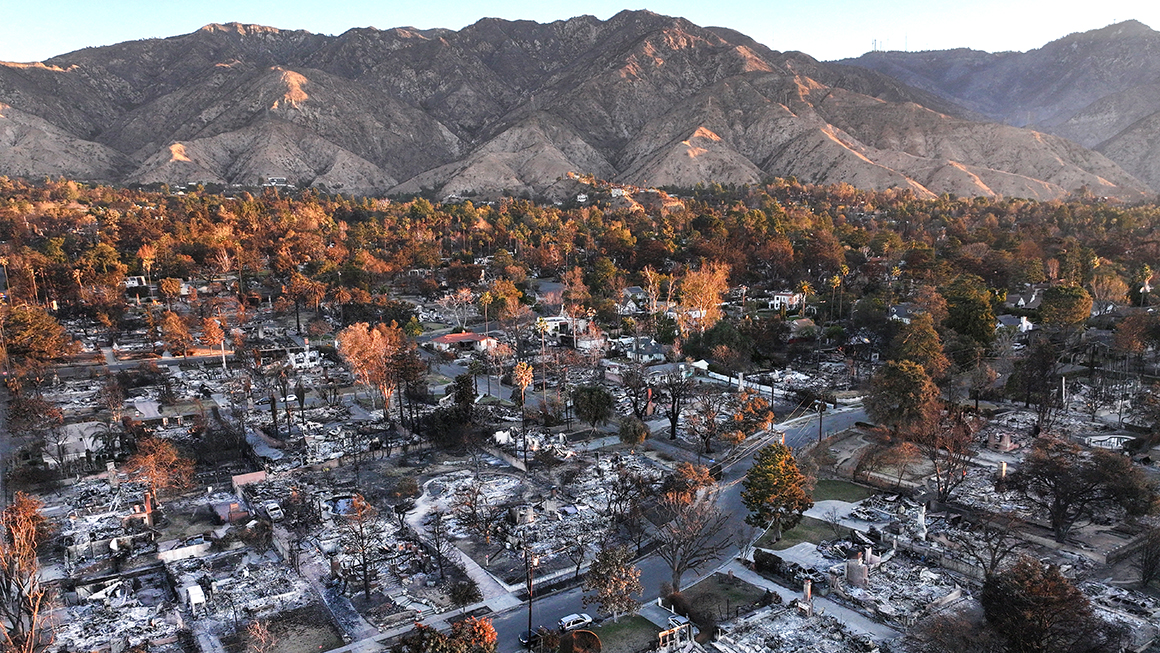
Among the many stories emerging from the Los Angeles wildfires are those highlighting their exceptional toll on people with disabilities, including a disabled father and his son who died because they were unable to evacuate from their home and nursing home evacuees facing basic supply shortages.
Los Angeles is just the latest in a series of devastating climate-driven disasters, which are becoming more common. Unfortunately, disaster evacuation and recovery efforts don’t always meet the needs of people with disabilities, which can exacerbate housing and health inequities.
Disasters can leave disabled people without appropriate housing and shelter
Although Los Angeles has a robust disaster access program and the situation is still unfolding, past disasters have taught us that emergency services can be overwhelmed. For disabled people who are displaced and need housing, short-term options are often unavailable or inadequate.
Accessible hotel rooms and short-term rentals are always in short supply, but even more so during and after a disaster, which limits the options for residents with mobility or other limitations. Residents seeking housing assistance also need to access this information online or by phone, which may be difficult or impossible for people with certain types of disabilities. Then, they need to travel to shelters or emergency service centers, which may or may not be accessible, have bathrooms and beds that people with mobility limitations can use, and offer quiet spaces for people with neurological disabilities. Finally, many older adults and people with disabilities are especially vulnerable to respiratory viruses like COVID-19 and the flu, the risk of which are higher in group shelters, potentially leading to serious health consequences.
This shortage of safe and accessible emergency housing options means it’s even more critical to help disabled people access appropriate longer-term housing. But longer-term housing solutions are equally—if not more—challenging. The supply of affordable housing units for disabled people is severely limited, and there are very few truly accessible subsidized units.
In past disasters, the lack of shelter and housing options has meant that disabled people end up in institutions—hospitals and nursing homes. In Los Angeles, the fire damaged nursing homes and assisted living facilities in Pasadena and Pacific Palisades, meaning those residents were likely relocated to other facilities, which might be far from family and friends. These placements can have long-term consequences for people’s physical and mental health and are more costly than home- and community-based care.
Disasters can worsen health and health care access for disabled people
Disasters such as wildfires are likely to pose health care challenges for disabled people, as evacuations and displacement are likely to interrupt access to critical health care services, home- and community-based services, and medical supplies and equipment.
The COVID-19 pandemic caused many people with disabilities to experience interrupted access to medical equipment and other health services and supports, which research has shown can worsen health conditions for disabled people and make it challenging for them to carry out day-to-day activities. These interruptions laid bare how challenging it can be for disabled people to access these types of services during emergencies.
Wildfires can also harm people’s physical and mental health. Smoke from wildfires contains toxins and other particulate matter, with those affected reporting difficulty breathing, nausea, and headaches. Consequently, wildfires are likely to exacerbate chronic respiratory conditions, which can be disabling for some people and could increase the risk of chronic respiratory illnesses and cancer for all exposed.
Postdisaster circumstances, such as meeting basic needs and increased financial pressures, loom large for all displaced people and can have worsening effects on mental health. But for people with disabilities, additional stressors associated with securing accessible housing and continuing home and health care services can compound mental health effects. The stressors associated with this unmet need can also extend to others in the family—past work shows that disabled relatives’ unmet health needs can cause family caregivers to experience increased stress and negative mental health effects.
Ensuring an inclusive recovery for disabled Los Angeles residents
The scale of the Los Angeles fires is almost unimaginable, and there’s no question it’ll take many years to recover. As the city plans for the housing needs of people with disabilities, officials will need to factor in accessible temporary housing near transportation and other services. Given the predisaster shortage of such housing, it’s likely that many disabled people may be displaced from their communities for many years. Some may be able to return to their property using FEMA (Federal Emergency Management Agency) trailers, but that solution isn’t viable for people with significant mobility limitations.
In the longer term, the city can create new and better housing options for disabled people. Specifically, Los Angeles County could learn from an existing model of disability-forward housing that provides accessible, service-enriched affordable housing. City leaders can also work with innovative developers offering trauma-informed housing models, which are designed to meet residents’ housing and service needs. More broadly, groups like the Partnership for Inclusive Disaster Strategies offer support to disabled residents during disaster recovery. These groups are especially important for disabled residents who have suffered the trauma of displacement and loss and will help prevent further institutionalization—and reduce long-term costs.
Recovery efforts can meet disabled people’s health and health care needs by providing comprehensive screening and referrals at emergency shelters, assistance replacing lost or damaged equipment, and masks and other protective equipment for people who are immunocompromised. Mutual aid groups like MaskBlockLA have distributed respirators to disabled people during the fires. Officials can also help people with disabilities address mental health needs by helping people get to health care appointments, especially given that transportation barriers among disabled people are likely to worsen after disasters.
Let’s build a future where everyone, everywhere has the opportunity and power to thrive
Urban is more determined than ever to partner with changemakers to unlock opportunities that give people across the country a fair shot at reaching their fullest potential. Invest in Urban to power this type of work.